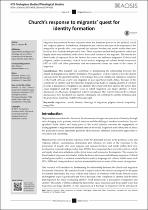| dc.contributor.author | Klaasen, John S. | |
| dc.date.accessioned | 2022-05-26T08:32:12Z | |
| dc.date.available | 2022-05-26T08:32:12Z | |
| dc.date.issued | 2021 | |
| dc.identifier.citation | Klaasen, J.S., 2021, ‘Church’s response to migrants’ quest for identity formation’, HTS Teologiese Studies/ Theological Studies 77(3), a6646. https://doi.org/ 10.4102/hts.v77i3.6646 | en_US |
| dc.identifier.issn | 2072-8050 | |
| dc.identifier.uri | https://doi.org/ 10.4102/hts.v77i3.6646 | |
| dc.identifier.uri | http://hdl.handle.net/10566/7461 | |
| dc.description.abstract | Migration has received diverse responses from the dominant powers in the political, social
and religious spheres. Assimilation, domination and cohesion are some of the responses to the
integration of people who cross regional and national borders and reside within their new
locations for a considerable period of time. These responses include both positives, which are
largely short-term solutions, with a lot of losses and trauma for the migrants. The reasons for
these kinds of responses lie in the factors that cause and influence migration. Political and
religious conflict, economics, societal factors such as language and culture, health issues such
HIV or AIDS and other pandemics and environmental factors are some of the causes of
migration. | en_US |
| dc.language.iso | en | en_US |
| dc.publisher | AOSIS | en_US |
| dc.subject | Migration | en_US |
| dc.subject | Church | en_US |
| dc.subject | Identity | en_US |
| dc.subject | Hospitality | en_US |
| dc.subject | Religion | en_US |
| dc.title | Church’s response to migrants’ quest for identity formation | en_US |
| dc.type | Article | en_US |

